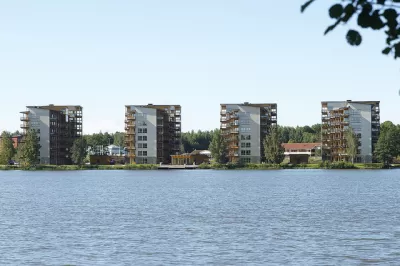Portland, Oregon lives up to its reputation as a testing ground for urbanism innovation by approving what will become the nation's tallest wood framed building.

"An 11-story timber high-rise planned in Portland's Pearl District has been approved for construction," reports Elliot Njus, "a milestone for wood technology that could allow for even taller timber buildings."
"At 148 feet, the Framework building will be the nation's first high-rise building made of wood," adds Njus.
As reported in another article by Njus and Molly Harbarger, Portland is pressing for more wood construction to support the region's timber industry.
Other cities around the world, like Toronto, are allowing larger wood framed buildings because they tend to be cheaper than steel framed buildings. High profile examples of timber skyscrapers have been proposed in Paris and Minneapolis. Skepticism toward the building practice can still be found in the Atlanta suburb of Sandy Springs, however, which recently took steps to limit the construction of wood framed buildings.
FULL STORY: Timber high-rise planned in Pearl District gets construction permit

Maui's Vacation Rental Debate Turns Ugly
Verbal attacks, misinformation campaigns and fistfights plague a high-stakes debate to convert thousands of vacation rentals into long-term housing.

Planetizen Federal Action Tracker
A weekly monitor of how Trump’s orders and actions are impacting planners and planning in America.

San Francisco Suspends Traffic Calming Amidst Record Deaths
Citing “a challenging fiscal landscape,” the city will cease the program on the heels of 42 traffic deaths, including 24 pedestrians.

Defunct Pittsburgh Power Plant to Become Residential Tower
A decommissioned steam heat plant will be redeveloped into almost 100 affordable housing units.

Trump Prompts Restructuring of Transportation Research Board in “Unprecedented Overreach”
The TRB has eliminated more than half of its committees including those focused on climate, equity, and cities.

Amtrak Rolls Out New Orleans to Alabama “Mardi Gras” Train
The new service will operate morning and evening departures between Mobile and New Orleans.
Urban Design for Planners 1: Software Tools
This six-course series explores essential urban design concepts using open source software and equips planners with the tools they need to participate fully in the urban design process.
Planning for Universal Design
Learn the tools for implementing Universal Design in planning regulations.
Heyer Gruel & Associates PA
JM Goldson LLC
Custer County Colorado
City of Camden Redevelopment Agency
City of Astoria
Transportation Research & Education Center (TREC) at Portland State University
Jefferson Parish Government
Camden Redevelopment Agency
City of Claremont



























